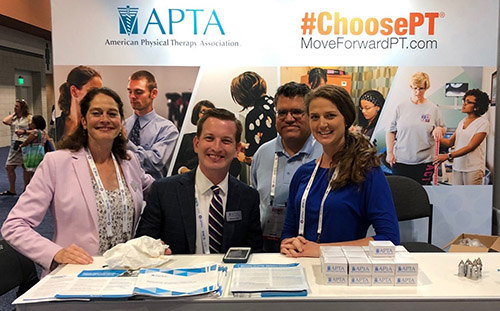APTA was again a leading exhibitor at the National Conference of State Legislatures (NCSL) annual Legislative Summit, this year held August 5-8 at the Music City Center in Nashville, Tennessee. Numerous state lawmakers from across the country visited the APTA booth, where staff and members of the Tennessee Physical Therapy Association educated them about the Physical Therapy Compact, direct access to physical therapist services, the role of physical therapy in pain management, high patient copays for physical therapy, and other issues important to the physical therapy profession at the state level. T. J. Cantwell from the Physical Therapy Compact was also on hand at the booth to provide information on the interstate licensure compact for physical therapy, which 26 states have so far enacted.
NCSL is a bipartisan organization that serves the legislators and staff of the nation's states, commonwealths, and territories. This year's annual conference attracted almost 5,000 state legislators, regulators, association representatives, corporations, and public policy experts from around the country.

From left: Katy Neas, APTA executive vice president of public affairs; Michael Lewis, APTA state affairs specialist; T. J. Cantwell from the Physical Therapy Compact; and Sarah Suddarth, PT, DPT, vice president of the Tennessee Physical Therapy Association.